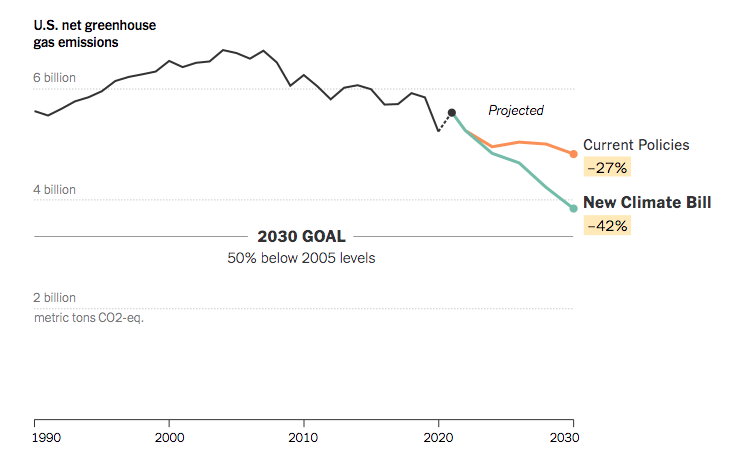The U.N. declared the theme of Earth Day 2023 “Invest in Our Planet.” Given the rapid increase in climate-related investments, perhaps that slogan should be “keep investing in our planet.” Many businesses have heeded the call for climate-friendly investments.
According to a report released by American Clean Power in December, the final three months of 2022 saw the same amount of clean energy investment as the whole of 2021—over $40B. Some recent climate investments made by governments and private entities underscore how seriously the public and private sectors in the U.S. are taking the issue of climate change.
Inflation Reduction Act and climate
The recently signed Inflation Reduction Act will significantly increase U.S. climate investments, with the aim of having America reduce its carbon emissions by 50% below 2005 levels by 2030.


The IRA offers tax incentives to accelerate the transition to clean energy, including for energy efficiency home improvements, and lays out various solar, wind, and battery storage projects coming online in the next 5 years. This also includes 12 new solar manufacturing facilities that are expected to increase American solar module manufacturing capacity by 300%. Many of the IRA’s plans make use of biotechnology, including turning agricultural waste into sustainable aviation fuel and sustaining livestock with feed that results in fewer methane emissions.
Trees that absorb more carbon
Earlier this year, Living Carbon secured $21M in Series A funding for its photosynthesis-enhanced trees which absorb more carbon. The firm recently developed a hybrid poplar, which absorbs approximately 27% more carbon dioxide. Such innovation is particularly important given a recent study that showed the Amazon rainforest may now be a carbon emitter rather than a carbon sink.
Pollution to fertilizer
Biotech company Andes recently secured $30M in Series A funding to develop its biological nitrogen fixation technology, where microorganisms capable of sequestering nitrogen from the air, grow on plant roots and fertilize the plants, making synthetic fertilizers unnecessary. According to a study in Nature Food, the production and use of nitrogen fertilizers accounts for 5% of global greenhouse gas emissions. Innovations in the agricultural sector are necessary to reduce the chances of runaway warming.
Sustainable aviation fuels (SAF)
SAFs are seeing investment from major airlines, including United. Made from used cooking oil and agricultural waste, these fuels emit 80% fewer carbon dioxide emissions compared to conventional aviation fuels. Gevo, Inc. recently opened a facility in South Dakota dedicated to the development of sustainable aviation fuels. The company aims to decarbonize transportation fuels, including gasoline and diesel. According to the International Energy Agency, “In 2021 aviation accounted for over 2% of global energy-related CO2 emissions, having grown faster in recent decades than road, rail or shipping.” Reducing aviation-related emissions could put a significant dent in global emissions and get the world closer to achieving its 1.5-2C warming target.
Lab-grown meat
Raising animals for meat, whether it’s chicken, beef, lamb, or pork, releases approximately 15% of global greenhouse gas emissions. Myriad companies have emerged that focus on meat cultivated from animal cells, which forgoes the process of raising the animals on a farm (often in inhumane conditions.) A study conducted by Oxford University and the University of Amsterdam estimates that “cultured meat would require 7-45% less energy to produce than the same volume of pork, sheep or beef,” but would require more energy to produce than chicken. The same study estimates that lab-grown meat could allow for a reduction in land and water use by 99% and 96% respectively. Companies producing lab-grown meat include: SuperMeat, MeaTech, Biftek, and Upside Foods.
While meat-like vegetarian options have gained traction in recent years, lab-grown meat shows promise in reducing emissions while keeping meat lovers happy.
Governments and the private sector are showing resolve in their mission to tackle climate change. While dire U.N. reports continue to show that the world is not on track to reach its warming targets if business-as-usual behavior continues into the end of this decade, climate is a major talking point among policymakers and business leaders alike. Innovation and investment into climate technologies continue to increase, and biotech is at the forefront.




